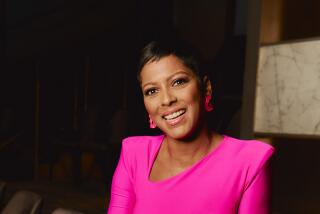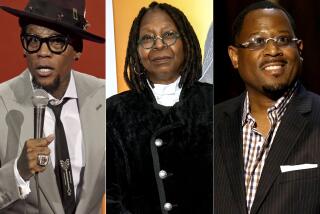Did NOW Find a Niche in Cable Programming? : Television: A deal to give the L.A. chapter a consulting voice at E! is a lesson in social protest and the role economics plays in entertainment decisions.
- Share via
In Hollywood where a deal is not always a deal, a strange deal was struck last week between the cable network E! Entertainment Television and the Los Angeles chapter of the National Organization for Women.
The two alphabeticals agreed to sit down and talk about programming, what areas of the network’s show-business emphasis might be covered, what new areas of entertainment journalism might be explored, a practice usually reserved for network programming executives.
You could almost imagine Mickey Mouse sitting down with the pest control people and MGM’s weary Leo settling down with the NRA and talking story lines.
The deal came about only after NOW, concerned about the second coming of radio personality Howard Stern to television in a half-hour interview show later this month, said it would boycott advertisers of Stern and E!, and if that didn’t work it would go after cable companies that carry E!
In another month and in another context, a deal like that with certain political figures would have brought commentators to the ramparts in defense of the republic and in opposition to the slightest suggestion that censorship and outside editorial influence were now at work in one part of our mass media.
Not this time, not in this context.
The deal is “unprecedented,” says Tammy Bruce,the local NOW president, who says members of her organization would be suggesting programming ideas to the network executives once meetings got under way, possibly this week.
Lee Masters, president of E!, doesn’t use the word unprecedented , but his network is facing a couple of firsts: a threatened boycott for a program service not known for doing anything controversial and an agreement to sit down with an advocacy group to talk about new areas of coverage.
On one side is a television network that once said it would be “celebrity friendly” in its coverage of Hollywood now agreeing to work with an organization that frequently accuses Hollywood decision makers of being overly friendly and sexist behind and in front of the camera.
On another side is an advocacy group that talks of its “feminist agenda” when it goes to the conference table while, in Bruce’s words, seeking “a balance of information” by “the gatekeepers of the media.”
Threats of boycotts have become a Hollywood staple, from economic and political threats against “Murphy Brown” to proponents of Turn Off TV Day to would-be censors of PBS programs. Almost as much a staple are efforts by advocacy groups to try to influence the content of movies and television shows. Most of Hollywood’s self-interest award shows are intended to get some idea across to the media--save the trees, save the seas, save the kids--and then put those ideas into the minds of viewers. Some advocacy groups offer resources--their own experts and their research--to writers and producers in the hope of show-business correctness. Even now NOW continues to campaign against advertisers on Stern’s KLSX radio show.
But rarely has a boycott threat led to that most sought-after and revered of Hollywood institutions, a meeting.
Bruce says NOW will not be consulting on individual programs but will offer a “feminist perspective on what might be planned. That’s why we will be brainstorming, to see what new programs might come out of our discussions.”
For Masters, “the intention of this agreement is not for NOW to become producers, not to go into the editing booths. We want to hear their opinions on women’s issues, on what we need to address in our work. It’s up to us to say what is good or not good programming. We aren’t running a public service network. NOW might suggest, E! might execute.”
Howard Stern and his shock-talk attacks on women and the feminist movement may have led to this new alliance, but something else was also at work.
Despite being owned by a consortium of Time Warner and several cable systems, E! has struggled to find its place in the cable universe since its start less than three years ago. It claims 20 million subscribers in 860 cable systems, but the network has yet to be profitable and in some areas isn’t offered for 24 hours as are older and more established services. Something was needed to draw a crowd.
Stern draws a crowd, for some a mob.
Not only did E! envision crowds of viewers building into ratings and needed advertising, but more importantly, it saw Stern as a way of endearing the network to cable operators by bringing in new subscribers. But then came NOW.
Several E! executives had mixed feelings about the Stern interview show and the threatened boycott. Some argued to stand up to the boycott. It wasn’t so much a constitutional stand as an economic one--the fight would stimulate attention for the new show and the network. Others argued against Stern and said that E! didn’t need this kind of fight or publicity. The boycott could threaten advertisers but more importantly it could threaten the network’s relations with its cable operators, who have had enough troubles this year fighting Congress and subscriber fall-offs.
Tammy Bruce says her organization’s intention is “not to silence someone or remove someone from the air or to stop a broadcast or a publication. We look at the larger message that a person like Stern is offering--his misogyny and his sexism--and ask if that is being balanced. Is there any alternative message regarding the position of women in our society? Our concern is also strongly about the lack of responsibility on the part of decision makers who say that putting on Stern without offering anything else is just fine.”
“Howard is Howard,” says E!’s Masters. “We aren’t taking him off. At the same time we aren’t going to engage in a fight with any person or any group which has what we believe are good goals. That would be counterproductive. We can do a lot of things together.”
Masters claims the new show has attracted some of his regular advertisers to schedule time with Stern. But so far, no new business.
“Howard will help our viewership and our relations with cable companies. Howard has a large radio audience, he’s solidly No. 1 in many markets. I think he can attract that audience to us. I look for our ratings to go up.”
Tammy Bruce will be looking, too. “If Howard causes problems we’ll be watching. We have this deal and trust Lee Masters. At the same time we think E! will come through with the issue-based ideas that we think a network that covers Hollywood should be examining--sexual harassment and discrimination, a plethora of ideas.”
Long before last week’s “unprecedented” deal, E!’s programmers had planned a series of documentaries on Hollywood hosted by Ron Reagan. One subject would be women in Hollywood.
Another, appropriately enough: censorship . . . censorship, Hollywood-style.
More to Read
The biggest entertainment stories
Get our big stories about Hollywood, film, television, music, arts, culture and more right in your inbox as soon as they publish.
You may occasionally receive promotional content from the Los Angeles Times.










